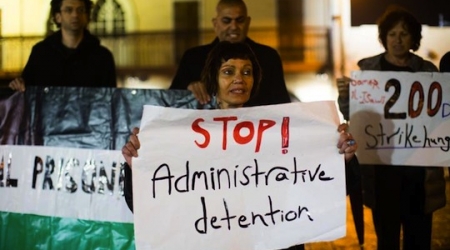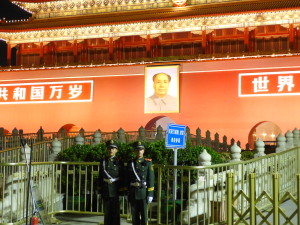The Future is Already Present? How the Draft Foreign NGO Management Law Could Be Applied
For Part 1, which analyzes precisely how the law will restrict foreign NGOs in China, please click here.

The Five Feminists – Clockwise from top left: Zheng Churan, Li Tingting, Wang Man, Wu Rongrong, and Wei Tingting
For anyone who still doubts that the draft Foreign NGO Management Law is about the Public Security’s Bureau’s ability to control foreign NGOs and their domestic partners, recent events – namely the detention of five feminist activists, the indictment of the head of the Chinese think tank, the Transition Institute, and the expulsion of foreign aid workers – should make clear that the draft law is primarily a security document.
The recent month-long detention of five female activists for planning a small, anti-sexual harassment demonstration was less about feminism than it was about the spirit of the draft Foreign NGO Management Law. According to a person with knowledge of the March 2015 interrogations of the five women, the police’s questions centered on the five women’s work with various foreign NGOs as well as their work with Yirenping, a successful Chinese public health NGO that often cooperates with foreign NGOs. The subject of the women’s planned demonstrations were a secondary issue for the police.
Similarly, the recent Recommendation for Prosecution of Guo Yushan and He Zhengjun, founders of the liberal think tank, the Transition Institute of Social and Economic Research, highlighted the Institute’s overseas funding and named various foreign NGOs (Heinrich Böll Stiftung (Germany), the Friedrich Naumann Stiftung (Germany), the Center for International Private Enterprise (U.S.), and Probe International (Canada)) as supporting the Institute’s “illegal business activities.”
The draft Foreign NGO Management Law, if passed in its current form, will make harassment of Chinese NGOs even easier than what we see now. No longer will the police need to twist the criminal law to suit its objectives or will it be stymied by an earnest prosecutor’s office. Article 38 of the draft Foreign NGO Management Law forbids Chinese individuals from receiving foreign funds from an NGO without an office in China, much like the Transition Institute allegedly did. Further, under Article 58(4), cooperating with an unregistered and unapproved foreign NGOs could lead to administrative detention of five days and a fine of 50,000 RMB (approximately $8,050).
Administrative detention is a form of punishment in China instituted at the behest of the local public security bureau with no judicial oversight.[1] It has long been criticized for violation of the arbitrary detention prohibition of the International Covenant on Civil and Political Rights (ICCPR) and, with little way to challenge it, is ripe for abuse including torture. For those considered “personnel” of the foreign NGO, administrative detention could up to 10 days (Article 57) or 15 days (Article 59). With these expansive provisions, the public security bureaus will have a new tool to harass grassroots NGOs the police believe are “troublesome,” like it currently has deemed Yirenping.
with no judicial oversight.[1] It has long been criticized for violation of the arbitrary detention prohibition of the International Covenant on Civil and Political Rights (ICCPR) and, with little way to challenge it, is ripe for abuse including torture. For those considered “personnel” of the foreign NGO, administrative detention could up to 10 days (Article 57) or 15 days (Article 59). With these expansive provisions, the public security bureaus will have a new tool to harass grassroots NGOs the police believe are “troublesome,” like it currently has deemed Yirenping.
Foreigners are not exempt from the draft law. The administrative penalties make little distinction between foreigners and Chinese citizens in terms of detention and fines. In addition, Article 62 gives the public security apparatus complete authority to deport a foreigner it deems in violation of the Foreign NGO Management Law. This provision should not come as a surprise given the recent expulsion of two foreign NGO workers – Tim Millar of the Rights Practice and Jérémie Béja of China Development Brief – on visa technicalities. Given the vagueness of the draft law, it will be very easy for the PSB to point to a provision of the Foreign NGO Management Law as a basis for deportation.
 These provisions, which give expansive, unchecked powers to the PSB, will have a chilling effect on both foreign and domestic NGOs if they are allowed to remain in the final law. Additionally, the inclusion of administrative detention puts China that much further from being able to ratify the ICCPR and be in-line with international standards. But this draft has yet to become law and if there is a silver lining in all of this, it is the fact that the National People’s Congress (NPC) has opened the draft to comment, even comments from the object of the law itself: foreign NGOs.
These provisions, which give expansive, unchecked powers to the PSB, will have a chilling effect on both foreign and domestic NGOs if they are allowed to remain in the final law. Additionally, the inclusion of administrative detention puts China that much further from being able to ratify the ICCPR and be in-line with international standards. But this draft has yet to become law and if there is a silver lining in all of this, it is the fact that the National People’s Congress (NPC) has opened the draft to comment, even comments from the object of the law itself: foreign NGOs.
To find out what foreign NGOs and foreign governments should be doing in light of the draft law, please click here to read Part 3.
**********************************************************************************************************
[1] As China Law Translate notes in its informative Cheat Sheet for Understanding the Foreign NGO Management Law, “[t]here is a mechanism for court review and compensation for those wrongfully given administrative detention, but the remedy often follows punishment if at all.”
 On Facebook
On Facebook By Email
By Email 
[…] The Future is Already Present? How the Draft Foreign NGO Management Law Could Be Applied, Elizabeth Lynch, May 11, 2015. […]
[…] The Future is Already Present? How the Draft Foreign NGO Management Law Could Be Applied, Elizabeth Lynch, May 11, 2015. […]
[…] On her China Law and Policy blog, Elizabeth Lynch has written a three-part analysis of the proposed Foreign NGO Law, the second draft of which has recently been read by the Standing Committee of the National People’s Congress. Under the revised draft, foreign NGOs will only be allowed to operate in China with explicit permission from a related government agency and the Public Security Bureau. In the first section of her analysis, Lynch emphasizes that while more transparency may well be needed in the NGO sector in China, the law as proposed does not seek to achieve that. Rather, it puts management of NGO activities under the security apparatus, which will result in a “survival of the fittest” environment for foreign groups. As she writes in the second installment, which focuses on the potential application of the law: […]
[…] The Future is Already Present? How the Draft Foreign NGO Management Law Could Be Applied | China Law… These provisions, which give expansive, unchecked powers to the PSB, will have a chilling effect on both foreign and domestic NGOs if they are allowed to remain in the final law. Additionally, the inclusion of administrative detention puts China that much further from being able to ratify the ICCPR and be in-line with international standards. But this draft has yet to become law and if there is a silver lining in all of this, it is the fact that the National People’s Congress (NPC) has opened the draft to comment, even comments from the object of the law itself: foreign NGOs. […]